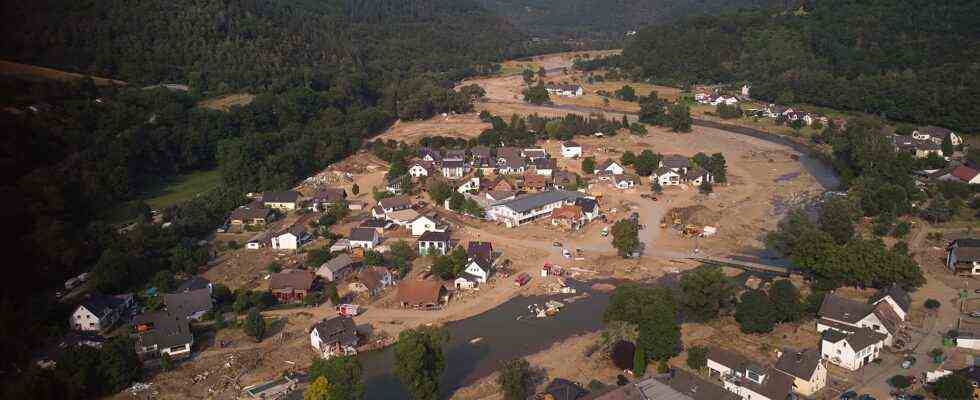Exclusive
Status: 08/13/2021 1:57 p.m.
The Federal Office for Civil Protection was apparently surprised by the extent of the flood disaster. This shows the evaluation of situation reports from the disaster week to the Federal Ministry of the Interior, which the WDR are present.
Since the devastating storms in mid-July, the Federal Office for Civil Protection and Disaster Aid (BBK) has come under fire. An evaluation of internal documents now shows that the authority may have underestimated the extent of the disaster.
the WDR has requested and evaluated this via the Freedom of Information Act from the Federal Ministry of the Interior. These are the daily situation reports that were sent to the Federal Ministry of the Interior from the Joint Reporting and Situation Center of the Federal Government and the Länder (GMLZ) in the week of the flood disaster. The situation center is located at the Federal Office for Civil Protection and Disaster Relief in Bonn.
Hardly any reliable forecasts
In Germany, it is not the federal government that is responsible for disaster control, but the states and municipalities. The Federal Office only provides disaster relief, mediates coordination requests and bundles information in a joint situation center. The situation reports show that in the days following the disaster, the responsible experts mainly provided summaries of what had already happened and what had happened, but hardly any reliable forecasts.
At least 180 people were killed in the storm with devastating floods in mid-July, and cell phone networks and drinking water supplies collapsed. Entire cities were under water and dams threatened to break.
Risk underestimated?
In their daily report to the Federal Ministry of the Interior, the experts reported on July 12th that the precipitation would “locally lead to typical severe weather effects such as overflows of small rivers and limited floods. Full basements, minor landslides and traffic obstructions are likely.” Conclusion of the situation center: “A transnational flood situation is not expected according to the current forecast.”
One day later, on the afternoon of July 13, the officials noted, according to the German Weather Service, that up to 200 liters of precipitation per square meter can be expected – an amount that usually only falls within two to three months. Nevertheless, they still saw “no transnational flood situation” coming.
On July 14th, videos of sometimes dramatic scenes from Hagen in North Rhine-Westphalia circulated on social media. TV reporters reported live about the devastating floods. On that day, the situation center came to the conclusion that “a transnational and civil protection-relevant damaging event is not to be expected”. Balance of the overall assessment of the situation on July 14th: “A large-scale flood situation with a cross-border need for coordination is not currently assumed.” The “Bild” newspaper had already reported on this status report from July 14th.
Ministry did not issue all reports
Only when the extent of the catastrophe could no longer be overlooked did the officials note in a special assessment on July 15, shortly after midnight: “Due to the large scale of the events, supra-local aid, possibly also across borders, can be assumed.” At this point in time, the Bundeswehr was already on the rescue with 230 soldiers, 38 wheeled vehicles and two tanks.
On the afternoon of July 15, the situation center then wrote to the federal government that “a transnational and civil protection incident cannot be ruled out.” The documents that the WDR could not yet show the whole picture: the Federal Ministry of the Interior did not want to publish a situation report. This was classified as classified by the Federal Office for Civil Protection.
Ministry does not want to comment
The President of the Federal Office for Civil Protection and Disaster Relief, Armin Schuster, did not comment on his office’s assessment of the situation when asked. In the past, Schuster had defended the Federal Office: Its task is to provide a warning system in the event of a defense. Local authorities and districts are responsible. Between Wednesday morning and Saturday noon, 150 warning messages were sent via the BBK system, said Schuster in the Daily Topics. However, he has no influence on how the warnings from his authority are dealt with on site.
The Federal Ministry of the Interior did not want to evaluate the work of the BBK in the run-up to the flood disaster. A spokeswoman said on request: “With a view to the ongoing investigative proceedings of the public prosecutor’s offices in the federal states concerned, the Federal Ministry of the Interior is currently not making any statements.” In Rhineland-Palatinate, the public prosecutor’s office is currently investigating the district administrator of Ahrweiler on suspicion of negligent homicide and negligent bodily harm through negligence.
Politicians are calling for reforms
In a special meeting, the Interior Committee in the German Bundestag asked the head of the authorities Schuster and Interior Minister Horst Seehofer about disaster management. Participants heard that, for reasons of piety, no blame should be given there because of the ongoing search for missing people at the time.
BBK boss Schuster had already admitted at the time that he could not claim that everything had gone optimally. Many MPs also see the problem less in the Federal Office for Civil Protection, but in the inadequate structures for more effective coordination between the federal government, the federal states and the districts. Reform efforts for greater coordination have also been blocked by the federal states for years.
In March, office chief Schuster, a long-time CDU member of the Bundestag who had only assumed office in November, presented a concept for a reorientation of the BBK together with Interior Minister Seehofer. This provides for more intensive cooperation between the federal and state governments in the event of a crisis. Numerous federal politicians are now calling for a realignment of disaster control in Germany.


